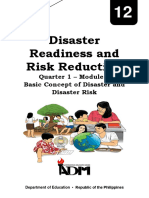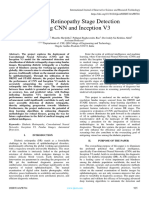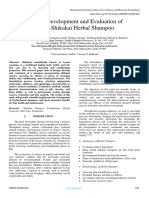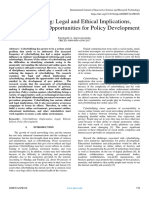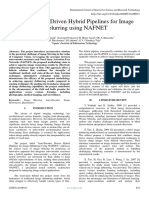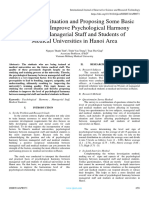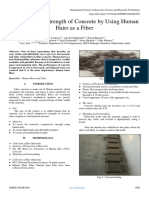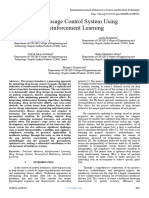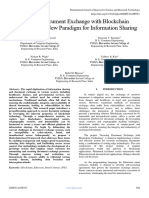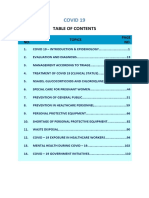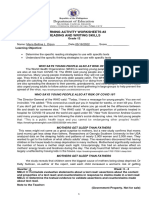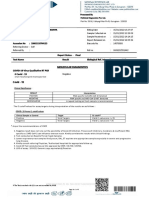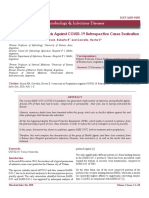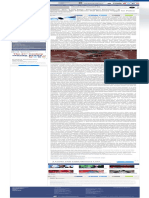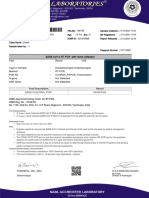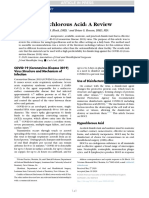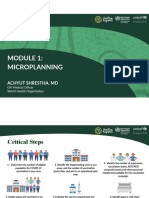Professional Documents
Culture Documents
Nutritional Status of Covid-19 Positive Patients
Copyright
Available Formats
Share this document
Did you find this document useful?
Is this content inappropriate?
Report this DocumentCopyright:
Available Formats
Nutritional Status of Covid-19 Positive Patients
Copyright:
Available Formats
Volume 6, Issue 7, July – 2021 International Journal of Innovative Science and Research Technology
ISSN No:-2456-2165
Nutritional Status of Covid-19 Positive Patients
Stefania Pellino, Department of Prevention, Azienda Sanitaria Locale (ASL) Benevento, Benevento, Italy.
Margherita Luciano, Department of Prevention, Azienda Sanitaria Locale (ASL) Benevento, Benevento, Italy.
Rosamaria Luciano, Department of Prevention, Azienda Sanitaria Locale (ASL) Benevento, Benevento, Italy.
Erika Mancini, Department of Prevention, Azienda Sanitaria Locale (ASL) Benevento, Benevento, Italy.
Maria Concetta Conte, Health Direction, Azienda Sanitaria Locale (ASL) Benevento, Benevento, Italy.
Gennaro Volpe, General Direction, Azienda Sanitaria Locale (ASL) Benevento, Benevento, Italy.
Tommaso Zerella, Department of Prevention, Azienda Sanitaria Locale (ASL) Benevento, Benevento, Italy.
Abstract:- A good nutritional status has a beneficial Microbiota is the set of microorganisms that colonize
influence on immune system. Nutritional status is the intestine and play a fundamental role in anti-
determined by healthy food consumption, vitamins and inflammatory response against pathogens. 70-80% of the
microelements have an important role in supporting the immune cells of our body are found in the intestine and,
immune system. Therefore, their deficiency could therefore, the efficiency of this activity depends on the
increase susceptibility to infections such as Covid-19 variety of foods and the quality of the nutrients that we
disease. The purpose of this study is to highlight how introduce daily with food.
nutritional status affects the effectiveness of the immune
response in Covid-19 positive patients. Micronutrients, including vitamins (vitamins A, C, D,
E) and trace elements (zinc, selenium, iron, magnesium),
The study was conducted from March 2020 to June have an important role in supporting the immune system,
2020 at Health Prevention Department in Benevento therefore, their deficiency could increase susceptibility to
(Campania Region, South Italy). 133 patients accepted infections.
the questionnaire in the form of telephone interview.
Statistical test result using Odd test Ratio: 0,027 (IC For example, vitamin A is essential because it
95%: 0,009- 0,082). The patients with a good nutritional maintains the integrity of the skin and mucous membranes,
status have 0,027 times to be asymptomatic compared to which are the first barrier to external pathogens and some
others with insufficient nutritional status. orange-colored foods such as carrots, pumpkin, apricots, egg
yolk are rich of it.
Keywords:- Covid-19, Nutritional Status, Immune System.
Vitamin C cannot be synthesized by humans, so it is
I. INTRODUCTION important to take it in the diet and it supports various cell
defense mechanisms. A good vitamin C status counteracts
At the end of 2019 a new type of coronavirus was common viral infections such as respiratory diseases and
identified as the cause of a cluster of pneumonia cases in avoids the development of complications.
Wuhan, a city in the Hubei Province of China. It rapidly
spread, resulting in an epidemic throughout China, followed Vitamin D can modulate the innate and adaptive
by a global pandemic that was officially declared by the immune responses. Deficiency in vitamin D is associated
World Health Organization on the 11th of March 2020. with increased autoimmunity as well as an increased
susceptibility to infection. Good sources of vitamin D are:
Coronavirus Disease (COVID-19) is asymptomatic or oily fish (such as salmon, sardines, herring, mackerel) and
presents with mild/ moderate symptoms (fever, dry cough, egg yolks.
fatigue, anosmia/dysgeusia) and heals without
hospitalization but, in some patients, can cause bilateral Zinc is an essential mineral found in all organs, tissues
interstitial pneumonia, respiratory distress syndrome up to and body fluids and is the second most abundant trace
death. Clinical features are determined above all by the mineral after iron. A deficiency has been associated with
underlying pathologies of the infected: the elderly and those many pathological conditions, including colds and
who are already suffering from other diseases are certainly pneumonia. Zinc is found in legumes, pine nuts, walnuts,
at greater risk of developing severe forms. Infection can almonds and hazelnuts.
have a different impact on the immune system, paving the
way for a more or less serious form of Covid-19. The Finally, magnesium is the cofactor of over 300 cellular
different course of the disease, regardless of the initial enzymes and its deficiency is associated with a state of
conditions of the infected, seems also guided by the immune chronic inflammation.
response that is triggered in each patient. Therefore, in
addition to strict compliance with the anti-contagion rules, is The aim of this study is to highlight how nutritional
essential try to strengthen our immune system, which is status affects the effectiveness of the immune response in
closely linked to the intestinal microbiota. Covid-19 positive patients.
IJISRT21JUL1021 www.ijisrt.com 1078
Volume 6, Issue 7, July – 2021 International Journal of Innovative Science and Research Technology
ISSN No:-2456-2165
II. MATERIALS AND METHODS patients consumed only one of these and 5 patients totaled a
score of 0.
This study was conducted on 133 patients, 60 females
(45,1%) and 73 males (54,9%) with Sars-Cov-2 infection In the group of pauci-symptomatic patients, only 3
during the first wave of Covid-19 pandemic in Benevento, a patients got a score of 7.5, the same for score of 5, only one
city of Campania Region (South Italy). We proposed a got a score of 10. 2 patients not consumed nothing about anti-
questionnaire in the form of telephone interview to a group inflammatory foods groups. The remaining 14 declared that
of 192 Covid-19 positive patients treated by Health they regularly consume only one of the categories of food
Prevention Department. Only 133 patients accepted the indicated (score 2.5).
interview.
Of the 13 patients with mild-moderate symptoms, 9 got
Non- respondents (59 patients) had severe symptoms a score of 0. Only one patient scored 2.5 and another totaled
or they were hospitalized. Interview was conducted from 10/10 score. 2 patients declared that they consume two
March 2020 to June 2020. The age of 133 patients ranged categories of anti-inflammatory foods. Nobody scored 7.5
from 3 years to 91 years (Table 1); under-18 patients score (Table 2).
answered with parentals authorization. The patients, non-
hospitalized, were classified into three groups: Also, 80% of patients declared that they are
asymptomatic; paucisymptomatic (patients with anosmia overweight.
and/or dysgeusia and/or asthenia and/or low-grade fever
and/or headache and/or myalgia); mild-moderate Asymptomatic Paucisymptomatic Symptomatic
symptomatic (TB > 37,5 C° and/or cough and/or dyspnea).
Patients answered questions about their eating practices and, score 10/10 65 (67%) 1 (4%) 1 (8%)
in particular, about their habits of consuming: fruits and score 7.5/10 18 (19%) 3 (13%) 0 (0%)
vegetables (sources of vitamins and minerals), oily fish, nuts score 5/10 7 (7%) 3 (13%) 2 (15%)
and seeds (sources of omega-3 and vitamin D), yogurt
(sources of probiotics), wholegrain cereals (sources of fibers score 2.5/10 2 (2%) 14 (61%) 1 (8%)
and B vitamins). Each of the four categories of anti- score 0/10 5 (5%) 2 (9%) 9 (69%)
inflammatory foods is assigned a value of 2,5. Overall score Table 2. Distribution of Nutritional Survey Score.
is equal to 10 for patients who regularly consume these
products. Score is equal to 7,5 for patients who consume The results of statistic test using Odd test Ratio are:
three of four foods categories. Score of 5 is assigned to 0,027 (IC 95%: 0,009- 0,082). A good nutritional status have
patients who consume two groups of anti-inflammatory 0,027 times to be asymptomatic compared with patients with
foods and score of 2,5 is for patients who consume only one insufficient nutritional status (Table 3). Nutritional status of
of these groups. In addition, patients should indicate whether Covid-19 patients is unknown but these results suggest that a
they are taking vitamin supplements. deficiency of vitamins and minerals may decrease the
immune defenses against Covid-19. However, more precise
Age Male Female Total studies are needed.
0-9 1 0 1
10 - 19 6 6 12 Nutritional Status Symptomatic Asymptomatic
20 - 29 12 9 21 Good 5 (3,8%) 83 (62,4%)
30 - 39 10 4 14 Insufficient 31 (23,3%) 14 (10,5%)
40 - 49 10 15 25 Total 36 (27,1%) 97 (72,9%)
50 - 59 17 17 34 Table 3. Analysis of nutritional status in Covid-19 positive
60 - 69 11 5 16 patients from March 2020 to June 2020).
70 - 79 1 1 2
This study had several limitations that are worth noting.
80 - 89 4 3 7
First, it was a study conducted at a single province with a
90 + 1 0 1 relatively small number of patients. Second, in this study
Total 73 60 133 many indicators of nutritional status were not measurable
Table 1. Characteristic of Covid-19 positive patients. such as vitamin D level or minerals level. Third, this study
not included patients with several symptoms.
III. RESULTS
IV. DISCUSSION
133 patients were interviewed: 97 (73%) were
asymptomatic, 23 (17%) pauci-symptomatic, 13 (10%) with Nutritional status can affect the body's immune
symptoms mild- moderate. Among asymptomatic patients, 65 response to viral infections.
said they regularly consume each category of foods totaling
(score 10/10). 18 patients totaled a score of 7.5 (3 food The ingestion of meals with a high energy content (fats
categories of 4 consumed habitually), 7 patients reported and sugars) is able to trigger a metabolic and immune
consuming two categories of anti-inflammatory foods, 2 response in the body and over time to determine a chronic
IJISRT21JUL1021 www.ijisrt.com 1079
Volume 6, Issue 7, July – 2021 International Journal of Innovative Science and Research Technology
ISSN No:-2456-2165
inflammatory status. Adipose tissue, in particular adipose Conflict of Interest
visceral tissue, causes an increase in the cytokines involved
in the inflammatory pathways (TNFα. MCP-1, IL6, leptin, The authors have nothing to disclose.
resistin, adiponectin, etc). Conversely, a diet rich in vitamins,
antioxidants, minerals and omega-3 reduces the levels of pro- REFERENCES
inflammatory cytokines.
[1]. Calder P.C., Carr A.C., Gombart A.F., Eggersdorfer
Omega 3 are polyunsaturated fatty acids deriving from M. Optimal Nutritional Status for a Well-Functioning
alpha linolenic acid. They are contained in large quantities in Immune System Is an Important Factor to Protect
bluefish. They are precursors of anti-inflammatory molecules against Viral Infections. Nutrients. 2020;12(4)
and perform cardio protective functions resulting in less [2]. Chandra R.K. Nutrition, immunity, and infection:
platelet aggregation. The latter capacity is fundamental in present knowledge and future directions. Lancet. 1983
counteracting prothrombotic activity in SARS COVID-19 [3]. Grant W.B., Lahore H., McDonnell S.L., Baggerly
infection. Fundamental are natural antioxidants such as C.A., French C.B., Aliano J.L. Evidence that vitamin
vitamins A, C, E, selenium, carotenoids, lycopene, coenzyme D supplementation could reduce risk of influenza and
Q-10 and lipoic acid. They are primarily present in fresh fruit COVID-19 infection and
and vegetables. These elements are able to counteract, slow deaths. Nutrients. 2020;12(4):988.
down or neutralize the formation of oxygen radicals. Oxygen [4]. Hänsch R., Mendel R.R. Physiological functions of
radicals, known as free radicals, can cause damage to various mineral micronutrients (Cu, Zn, Mn, Fe, Ni, Mo, B,
molecules and cell structures, primarily DNA. Cl) Curr. Opin. Plant Biol. 2009;12:259–266.
[5]. Banerjee A., Kulcsar K., Misra V., Frieman M.,
In recent years, the importance of using probiotics and Mossman K. Bats and coronaviruses. Viruses.
prebiotics has increasingly emerged. Probiotics are living and 2019;11:41.
active microorganisms (especially bacteria) capable of [6]. Shahidi F., Ambigaipalan P. Phenolics and
benefiting the host. They are naturally contained in yogurt polyphenolics in foods, beverages and spices:
and live lactic ferments. Prebiotics, instead, are those non- Antioxidant activity and health effects-A review. J.
digestible organic substances that promote the growth of Funct. Foods. 2015;18:820–897.
good bacteria and therefore the general well-being of the [7]. Rock C.L., Jacob R., Bowen P.E. Update on the
organism. Prebiotics are introduced into the diet through biological characteristics of the antioxidant
foods rich in fiber. micronutrients: Vitamin C, vitamin E, and the
carotenoids. J. Am. Diet. Assoc. 1996;96:693–702.
Probiotics and prebiotics modulate the immune and doi: 10.1016/S0002-8223(96)00190-3.
inflammatory response by interacting mainly with epithelial [8]. Huang C., Wang Y., Li X., Ren L., Zhao J., Hu Y.,
cells, dendritic cells and lymphoid follicles (Peyer's plaques) Zhang L., Fan G., Xu J., Gu X., et al. Clinical features
at the level of the intestine (microbiota). It has also been of patients infected with 2019 novel coronavirus in
shown that they stimulate the production of cytokines by Th- Wuhan, China. Lancet. 2020;395:497–506. doi:
1 lymphocytes (IFN-gamma, IL-2, IL-12, TNF-alpha), Th-17 10.1016/S0140-6736(20)30183-5.
(IL-17, IL-22), T-reg (IL-10, TGF-beta), and instead decrease [9]. Islam M.T., Sarkar C., El-Kersh D.M., Jamaddar S.,
that by Th-2 (IL-4). Uddin S.J., Shilpi J.A., Mubarak M.S. Natural
products and their derivatives against coronavirus: A
A good nutritional status and healthy eating habits, as review of the non-clinical and pre-clinical data.
demonstrated in our study, resulted in a better immune Phyther. Res. 2020 doi: 10.1002/ptr.6700.
response with a reduction / absence of symptoms in patients [10]. Maggini S., Pierre A., Calder P.C. Immune function
with scores 10/10 and 7.5 / 10 compared to patients with and micronutrient requirements change over the life
scores 5/10, 2.5 / 10 or 0/10. Furthermore, we can course. Nutrients. 2018;10:1531.
hypothesize that patients with excellent nutritional status took [11]. Orhan I.E., Senol Deniz F.S. Natural Products as
fewer days to heal. Potential Leads Against Coronaviruses: Could They be
Encouraging Structural Models Against SARS-CoV-2?
V. CONCLUSION Nat. Prod. Bioprospect. 2020 doi: 10.1007/s13659-
020-00250-4.
The relationship between immunity and nutrition is [12]. Maggini S., Pierre A., Calder P.C. Immune function
well known. The daily intake of foods rich in vitamins, and micronutrient requirements change over the life
minerals, fiber and probiotics supports to enhance the course. Nutrients. 2018;10:1531.
intestinal microbiota who is essential for immune defenses. [13]. Maggini S., Wintergerst E.S., Beveridge S., Hornig
This suggests that a more effective immune response may be D.H. Selected vitamins and trace elements support
evidenced in patients with an optimal nutritional status. immune function by strengthening epithelial barriers
However, more precise studies and additional research are and cellular and humoral immune responses. Proc. Br.
needed. J. Nutr. 2007;98:29–35.
IJISRT21JUL1021 www.ijisrt.com 1080
Volume 6, Issue 7, July – 2021 International Journal of Innovative Science and Research Technology
ISSN No:-2456-2165
[14]. Gombart A.F., Pierre A., Maggini S. A review of
micronutrients and the immune system–working in
harmony to reduce the risk of infection. Nutrients. .
2020;12:236.
[15]. Food and Agriculture Organization of the United
Nations (FAO) Maintaining a Healthy Diet during the
COVID-19 Pandemic
[16]. Martineau A.R., Jolliffe D.A., Hooper R.L., Greenberg
L., Aloia J.F., Bergman P., Dubnov-Raz G., Esposito
S., Ganmaa D., Ginde A.A., et al. Vitamin D
supplementation to prevent acute respiratory tract
infections: Systematic review and meta-analysis of
individual participant data. BMJ. 2017;356 doi:
10.1136/bmj.i6583.
[17]. Gay R., Meydani S.N. The Effects of Vitamin E,
Vitamin B6, and Vitamin B12 on Immune Function.
Nutr. Clin. Care. 2001;4:188–198.
IJISRT21JUL1021 www.ijisrt.com 1081
You might also like
- The Sympathizer: A Novel (Pulitzer Prize for Fiction)From EverandThe Sympathizer: A Novel (Pulitzer Prize for Fiction)Rating: 4.5 out of 5 stars4.5/5 (119)
- Devil in the Grove: Thurgood Marshall, the Groveland Boys, and the Dawn of a New AmericaFrom EverandDevil in the Grove: Thurgood Marshall, the Groveland Boys, and the Dawn of a New AmericaRating: 4.5 out of 5 stars4.5/5 (265)
- The Little Book of Hygge: Danish Secrets to Happy LivingFrom EverandThe Little Book of Hygge: Danish Secrets to Happy LivingRating: 3.5 out of 5 stars3.5/5 (399)
- A Heartbreaking Work Of Staggering Genius: A Memoir Based on a True StoryFrom EverandA Heartbreaking Work Of Staggering Genius: A Memoir Based on a True StoryRating: 3.5 out of 5 stars3.5/5 (231)
- Grit: The Power of Passion and PerseveranceFrom EverandGrit: The Power of Passion and PerseveranceRating: 4 out of 5 stars4/5 (587)
- Never Split the Difference: Negotiating As If Your Life Depended On ItFrom EverandNever Split the Difference: Negotiating As If Your Life Depended On ItRating: 4.5 out of 5 stars4.5/5 (838)
- The Subtle Art of Not Giving a F*ck: A Counterintuitive Approach to Living a Good LifeFrom EverandThe Subtle Art of Not Giving a F*ck: A Counterintuitive Approach to Living a Good LifeRating: 4 out of 5 stars4/5 (5794)
- Team of Rivals: The Political Genius of Abraham LincolnFrom EverandTeam of Rivals: The Political Genius of Abraham LincolnRating: 4.5 out of 5 stars4.5/5 (234)
- Shoe Dog: A Memoir by the Creator of NikeFrom EverandShoe Dog: A Memoir by the Creator of NikeRating: 4.5 out of 5 stars4.5/5 (537)
- The World Is Flat 3.0: A Brief History of the Twenty-first CenturyFrom EverandThe World Is Flat 3.0: A Brief History of the Twenty-first CenturyRating: 3.5 out of 5 stars3.5/5 (2219)
- The Emperor of All Maladies: A Biography of CancerFrom EverandThe Emperor of All Maladies: A Biography of CancerRating: 4.5 out of 5 stars4.5/5 (271)
- The Gifts of Imperfection: Let Go of Who You Think You're Supposed to Be and Embrace Who You AreFrom EverandThe Gifts of Imperfection: Let Go of Who You Think You're Supposed to Be and Embrace Who You AreRating: 4 out of 5 stars4/5 (1090)
- The Hard Thing About Hard Things: Building a Business When There Are No Easy AnswersFrom EverandThe Hard Thing About Hard Things: Building a Business When There Are No Easy AnswersRating: 4.5 out of 5 stars4.5/5 (344)
- Her Body and Other Parties: StoriesFrom EverandHer Body and Other Parties: StoriesRating: 4 out of 5 stars4/5 (821)
- Hidden Figures: The American Dream and the Untold Story of the Black Women Mathematicians Who Helped Win the Space RaceFrom EverandHidden Figures: The American Dream and the Untold Story of the Black Women Mathematicians Who Helped Win the Space RaceRating: 4 out of 5 stars4/5 (894)
- Elon Musk: Tesla, SpaceX, and the Quest for a Fantastic FutureFrom EverandElon Musk: Tesla, SpaceX, and the Quest for a Fantastic FutureRating: 4.5 out of 5 stars4.5/5 (474)
- The Unwinding: An Inner History of the New AmericaFrom EverandThe Unwinding: An Inner History of the New AmericaRating: 4 out of 5 stars4/5 (45)
- The Yellow House: A Memoir (2019 National Book Award Winner)From EverandThe Yellow House: A Memoir (2019 National Book Award Winner)Rating: 4 out of 5 stars4/5 (98)
- On Fire: The (Burning) Case for a Green New DealFrom EverandOn Fire: The (Burning) Case for a Green New DealRating: 4 out of 5 stars4/5 (73)
- DRRR - Q1M1L1 Basic Concept of Disaster and Disaster RiskDocument19 pagesDRRR - Q1M1L1 Basic Concept of Disaster and Disaster RiskShane Ureta100% (1)
- DR Vernon Coleman - Coronavirus Why You Are Now in Great DangerDocument3 pagesDR Vernon Coleman - Coronavirus Why You Are Now in Great DangerGeorge KourisNo ratings yet
- Advancing Healthcare Predictions: Harnessing Machine Learning for Accurate Health Index PrognosisDocument8 pagesAdvancing Healthcare Predictions: Harnessing Machine Learning for Accurate Health Index PrognosisInternational Journal of Innovative Science and Research TechnologyNo ratings yet
- Diabetic Retinopathy Stage Detection Using CNN and Inception V3Document9 pagesDiabetic Retinopathy Stage Detection Using CNN and Inception V3International Journal of Innovative Science and Research TechnologyNo ratings yet
- Comparatively Design and Analyze Elevated Rectangular Water Reservoir with and without Bracing for Different Stagging HeightDocument4 pagesComparatively Design and Analyze Elevated Rectangular Water Reservoir with and without Bracing for Different Stagging HeightInternational Journal of Innovative Science and Research TechnologyNo ratings yet
- Design, Development and Evaluation of Methi-Shikakai Herbal ShampooDocument8 pagesDesign, Development and Evaluation of Methi-Shikakai Herbal ShampooInternational Journal of Innovative Science and Research Technology100% (3)
- Terracing as an Old-Style Scheme of Soil Water Preservation in Djingliya-Mandara Mountains- CameroonDocument14 pagesTerracing as an Old-Style Scheme of Soil Water Preservation in Djingliya-Mandara Mountains- CameroonInternational Journal of Innovative Science and Research TechnologyNo ratings yet
- Cyberbullying: Legal and Ethical Implications, Challenges and Opportunities for Policy DevelopmentDocument7 pagesCyberbullying: Legal and Ethical Implications, Challenges and Opportunities for Policy DevelopmentInternational Journal of Innovative Science and Research TechnologyNo ratings yet
- The Impact of Digital Marketing Dimensions on Customer SatisfactionDocument6 pagesThe Impact of Digital Marketing Dimensions on Customer SatisfactionInternational Journal of Innovative Science and Research TechnologyNo ratings yet
- The Utilization of Date Palm (Phoenix dactylifera) Leaf Fiber as a Main Component in Making an Improvised Water FilterDocument11 pagesThe Utilization of Date Palm (Phoenix dactylifera) Leaf Fiber as a Main Component in Making an Improvised Water FilterInternational Journal of Innovative Science and Research TechnologyNo ratings yet
- Dense Wavelength Division Multiplexing (DWDM) in IT Networks: A Leap Beyond Synchronous Digital Hierarchy (SDH)Document2 pagesDense Wavelength Division Multiplexing (DWDM) in IT Networks: A Leap Beyond Synchronous Digital Hierarchy (SDH)International Journal of Innovative Science and Research TechnologyNo ratings yet
- Formulation and Evaluation of Poly Herbal Body ScrubDocument6 pagesFormulation and Evaluation of Poly Herbal Body ScrubInternational Journal of Innovative Science and Research TechnologyNo ratings yet
- Auto Encoder Driven Hybrid Pipelines for Image Deblurring using NAFNETDocument6 pagesAuto Encoder Driven Hybrid Pipelines for Image Deblurring using NAFNETInternational Journal of Innovative Science and Research TechnologyNo ratings yet
- Electro-Optics Properties of Intact Cocoa Beans based on Near Infrared TechnologyDocument7 pagesElectro-Optics Properties of Intact Cocoa Beans based on Near Infrared TechnologyInternational Journal of Innovative Science and Research TechnologyNo ratings yet
- Explorning the Role of Machine Learning in Enhancing Cloud SecurityDocument5 pagesExplorning the Role of Machine Learning in Enhancing Cloud SecurityInternational Journal of Innovative Science and Research TechnologyNo ratings yet
- A Survey of the Plastic Waste used in Paving BlocksDocument4 pagesA Survey of the Plastic Waste used in Paving BlocksInternational Journal of Innovative Science and Research TechnologyNo ratings yet
- A Review: Pink Eye Outbreak in IndiaDocument3 pagesA Review: Pink Eye Outbreak in IndiaInternational Journal of Innovative Science and Research TechnologyNo ratings yet
- Navigating Digitalization: AHP Insights for SMEs' Strategic TransformationDocument11 pagesNavigating Digitalization: AHP Insights for SMEs' Strategic TransformationInternational Journal of Innovative Science and Research TechnologyNo ratings yet
- Automatic Power Factor ControllerDocument4 pagesAutomatic Power Factor ControllerInternational Journal of Innovative Science and Research TechnologyNo ratings yet
- Hepatic Portovenous Gas in a Young MaleDocument2 pagesHepatic Portovenous Gas in a Young MaleInternational Journal of Innovative Science and Research TechnologyNo ratings yet
- Studying the Situation and Proposing Some Basic Solutions to Improve Psychological Harmony Between Managerial Staff and Students of Medical Universities in Hanoi AreaDocument5 pagesStudying the Situation and Proposing Some Basic Solutions to Improve Psychological Harmony Between Managerial Staff and Students of Medical Universities in Hanoi AreaInternational Journal of Innovative Science and Research TechnologyNo ratings yet
- Review of Biomechanics in Footwear Design and Development: An Exploration of Key Concepts and InnovationsDocument5 pagesReview of Biomechanics in Footwear Design and Development: An Exploration of Key Concepts and InnovationsInternational Journal of Innovative Science and Research TechnologyNo ratings yet
- The Effect of Time Variables as Predictors of Senior Secondary School Students' Mathematical Performance Department of Mathematics Education Freetown PolytechnicDocument7 pagesThe Effect of Time Variables as Predictors of Senior Secondary School Students' Mathematical Performance Department of Mathematics Education Freetown PolytechnicInternational Journal of Innovative Science and Research TechnologyNo ratings yet
- Mobile Distractions among Adolescents: Impact on Learning in the Aftermath of COVID-19 in IndiaDocument2 pagesMobile Distractions among Adolescents: Impact on Learning in the Aftermath of COVID-19 in IndiaInternational Journal of Innovative Science and Research TechnologyNo ratings yet
- Enhancing the Strength of Concrete by Using Human Hairs as a FiberDocument3 pagesEnhancing the Strength of Concrete by Using Human Hairs as a FiberInternational Journal of Innovative Science and Research TechnologyNo ratings yet
- Drug Dosage Control System Using Reinforcement LearningDocument8 pagesDrug Dosage Control System Using Reinforcement LearningInternational Journal of Innovative Science and Research TechnologyNo ratings yet
- Securing Document Exchange with Blockchain Technology: A New Paradigm for Information SharingDocument4 pagesSecuring Document Exchange with Blockchain Technology: A New Paradigm for Information SharingInternational Journal of Innovative Science and Research TechnologyNo ratings yet
- Intelligent Engines: Revolutionizing Manufacturing and Supply Chains with AIDocument14 pagesIntelligent Engines: Revolutionizing Manufacturing and Supply Chains with AIInternational Journal of Innovative Science and Research TechnologyNo ratings yet
- Formation of New Technology in Automated Highway System in Peripheral HighwayDocument6 pagesFormation of New Technology in Automated Highway System in Peripheral HighwayInternational Journal of Innovative Science and Research TechnologyNo ratings yet
- Perceived Impact of Active Pedagogy in Medical Students' Learning at the Faculty of Medicine and Pharmacy of CasablancaDocument5 pagesPerceived Impact of Active Pedagogy in Medical Students' Learning at the Faculty of Medicine and Pharmacy of CasablancaInternational Journal of Innovative Science and Research TechnologyNo ratings yet
- Supply Chain 5.0: A Comprehensive Literature Review on Implications, Applications and ChallengesDocument11 pagesSupply Chain 5.0: A Comprehensive Literature Review on Implications, Applications and ChallengesInternational Journal of Innovative Science and Research TechnologyNo ratings yet
- The Making of Self-Disposing Contactless Motion-Activated Trash Bin Using Ultrasonic SensorsDocument7 pagesThe Making of Self-Disposing Contactless Motion-Activated Trash Bin Using Ultrasonic SensorsInternational Journal of Innovative Science and Research TechnologyNo ratings yet
- English Task: Make A Simple Analytical Exposition TextDocument3 pagesEnglish Task: Make A Simple Analytical Exposition TextHanna MeilovaNo ratings yet
- WHO Committee Agenda GuideDocument12 pagesWHO Committee Agenda GuideDeveeka MeshramNo ratings yet
- Covid 19 PDFDocument117 pagesCovid 19 PDFvicky anandNo ratings yet
- The Impact of COVID-19 Pandemic On Dental Practice: A Questionnaire-Based ReportDocument20 pagesThe Impact of COVID-19 Pandemic On Dental Practice: A Questionnaire-Based ReportJaxine Caballero LabialNo ratings yet
- Novel Dual Multiplex Real Time RT PCR Assays For The Rapid Detection of SARS CoV 2 Influenza A B and Respiratory Syncytial Virus Using The BD MAXDocument7 pagesNovel Dual Multiplex Real Time RT PCR Assays For The Rapid Detection of SARS CoV 2 Influenza A B and Respiratory Syncytial Virus Using The BD MAXHasna Mirda AmazanNo ratings yet
- Learning Activity Worksheets #2 Reading and Writing Skills: Department of EducationDocument2 pagesLearning Activity Worksheets #2 Reading and Writing Skills: Department of EducationMaria Bettina DizonNo ratings yet
- COVID-19 Quiz Review for Nurses: Coronavirus Symptoms, Transmission & PreventionDocument11 pagesCOVID-19 Quiz Review for Nurses: Coronavirus Symptoms, Transmission & Preventionhasan ahmdNo ratings yet
- Not Detected Covid-19 RT PCR: Test Name ResultDocument1 pageNot Detected Covid-19 RT PCR: Test Name ResultAnil PoddarNo ratings yet
- A Review On Ayurvedic Medicinal Herbs As Remedial Perspective For COVID-19Document21 pagesA Review On Ayurvedic Medicinal Herbs As Remedial Perspective For COVID-19Prabhat KcNo ratings yet
- Awareness, Knowledge and TrustDocument15 pagesAwareness, Knowledge and TrustYosi Reskhiyani SimamoraNo ratings yet
- Navdeep Madheshiya Report - 2022-01-15t183422.725Document1 pageNavdeep Madheshiya Report - 2022-01-15t183422.725navdeep madheshiyaNo ratings yet
- A Role of Trailokya Chintamani Ras in The Management of Covid Pandemic A Review - September - 2021 - 9745123061 - 6900361Document3 pagesA Role of Trailokya Chintamani Ras in The Management of Covid Pandemic A Review - September - 2021 - 9745123061 - 6900361Karan SharmaNo ratings yet
- Coronavirus British English Intermediate b1 b2 GroupDocument4 pagesCoronavirus British English Intermediate b1 b2 GroupAngel AnitaNo ratings yet
- Ivermectina - Profilaxis Covid-19 - DR HirschDocument8 pagesIvermectina - Profilaxis Covid-19 - DR HirschAlheni Fabiola Miranda GomezNo ratings yet
- World Journal of Pharmaceutical and Life Sciences: A Review On Corona Virus (Covid-19)Document7 pagesWorld Journal of Pharmaceutical and Life Sciences: A Review On Corona Virus (Covid-19)Warner LlaveNo ratings yet
- Performance Task in Empowerment Technologies (Arthur King v. Leaño III, 11-Ipil (ABM-MODULAR)Document13 pagesPerformance Task in Empowerment Technologies (Arthur King v. Leaño III, 11-Ipil (ABM-MODULAR)Mary AuxileNo ratings yet
- TP OverviewDocument8 pagesTP OverviewYOUSSEF SIYAHNo ratings yet
- The Impact of COVID-19 Pandemic On The Academic Performance of Veterinary Medical StudentsDocument8 pagesThe Impact of COVID-19 Pandemic On The Academic Performance of Veterinary Medical StudentsRitam chaturvediNo ratings yet
- VIDEO The Lock Step Simulation Scenario A Coronavirus-Like Pandemic That Becomes Trigger For Police State Controls - GlobaDocument1 pageVIDEO The Lock Step Simulation Scenario A Coronavirus-Like Pandemic That Becomes Trigger For Police State Controls - GlobaNemo NemoNo ratings yet
- Report of F - CH Maribel Snigitha CiceroDocument2 pagesReport of F - CH Maribel Snigitha CiceroR.Pearlsis SophiNo ratings yet
- A Sars Like Cluster of Circulating Bat Coronaviruses Shows Potential For Human EmergenceDocument17 pagesA Sars Like Cluster of Circulating Bat Coronaviruses Shows Potential For Human EmergencedavinmaximusNo ratings yet
- Disaster Readiness and Risk Reduction: Quarter 3 - Module 3: Disasters and Its EffectsDocument7 pagesDisaster Readiness and Risk Reduction: Quarter 3 - Module 3: Disasters and Its Effectsrhubby joy alivioNo ratings yet
- The Effects of Ethical Differences To The Efficacy of The Government in Resolving The Current PandemicDocument2 pagesThe Effects of Ethical Differences To The Efficacy of The Government in Resolving The Current PandemicKenneth posionNo ratings yet
- AMPLIRUN TOTAL SARS-CoV-2 CONTROL SWAB - MBTC030-R - RUO - ENDocument1 pageAMPLIRUN TOTAL SARS-CoV-2 CONTROL SWAB - MBTC030-R - RUO - ENChristian Saldaña DonayreNo ratings yet
- Suburban Diagnostics Covid 19 Report Positive PDFDocument1 pageSuburban Diagnostics Covid 19 Report Positive PDFJohn BeanNo ratings yet
- Drug Repurposing ApproachDocument30 pagesDrug Repurposing ApproachShofi Dhia AiniNo ratings yet
- Hypochlorous Acid COVID ReviewDocument6 pagesHypochlorous Acid COVID ReviewEnvirolyte Solutions InternationalNo ratings yet
- Microplanning: Achyut Shrestha, MDDocument110 pagesMicroplanning: Achyut Shrestha, MDMarchelleNo ratings yet





































